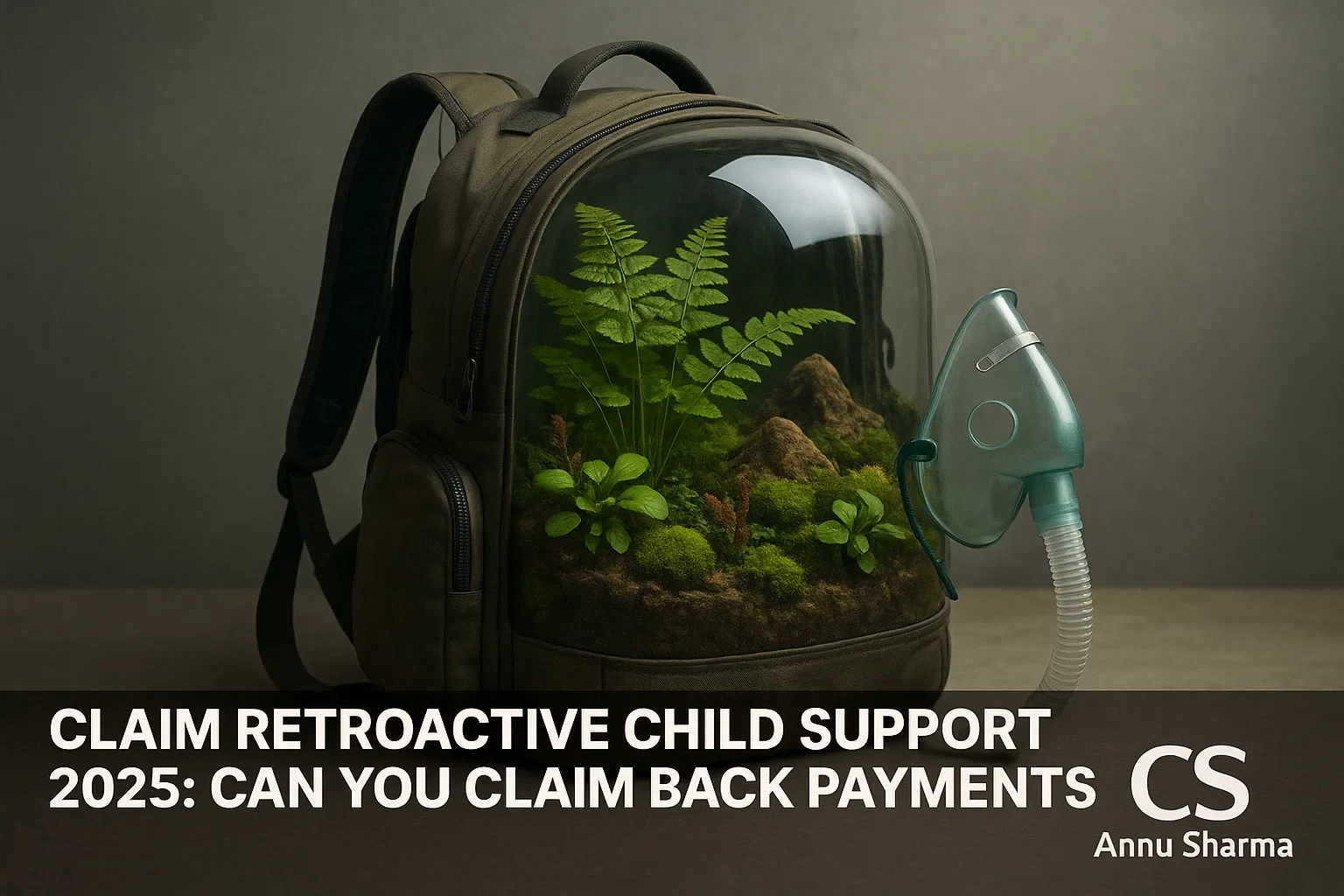Wondering if you can claim retroactive child support? Learn how back payments work, legal options, and how to secure unpaid support in the U.S. child support system.
What is Retroactive Child Support?
Retroactive child support, often called “back child support,” refers to unpaid child support that was due before a legal order was issued or enforced. In simpler terms, it’s money a parent should have paid to help raise their child—but didn’t.
Many parents wonder, “Can I still claim child support for the time before I filed?” or “Can I be forced to pay back child support?” This guide will answer those questions and more.
Table of Contents
Key Takeaway: Yes, You Can Claim Retroactive Child Support — Under the Right Circumstances
Each U.S. state has its own rules, but courts can and do award retroactive child support. The decision depends on your unique case, the child’s needs, and whether the other parent tried to avoid responsibility.
Why Retroactive Child Support Matters
Raising a child isn’t cheap. If one parent failed to contribute, it’s not just unfair—it can impact the child’s well-being.
Here’s why retroactive child support is important:
| Reason | Impact |
|---|---|
| Unpaid expenses | Covers past costs like food, clothing, schooling, and healthcare. |
| Legal accountability | Ensures the non-custodial parent fulfills financial responsibilities. |
| Future protection | Helps avoid similar problems in ongoing or future support arrangements. |
| Interest penalties | Unpaid amounts often accrue interest, boosting the value of the claim. |
When Can You Request Retroactive Child Support?
You may be able to claim back child support if:
- There was no existing support order when the child was born or during separation.
- The paying parent hid income or refused to acknowledge paternity.
- There was a delay in filing due to valid reasons (e.g., lack of legal resources or threats).
- Paternity was established later (e.g., through DNA test years after birth).
- The other parent left or abandoned the family, leaving you solely responsible.
🛑 Note: Courts may deny retroactive support if they find that the custodial parent unreasonably delayed filing or prevented visitation/contact without legal reason.

How Far Back Can Retroactive Child Support Go?
This depends on state law. Here are some examples:
| State | Retroactive Period |
|---|---|
| Texas | Up to 4 years, unless fraud or concealment is proven |
| California | Back to the date of filing for support, but sometimes further |
| New York | From date of child’s birth, if paternity is established late |
| Florida | Typically up to 24 months prior to the support filing |
⚖️ Tip: Even if your state has limits, intentional evasion or paternity denial can extend how far back the court will go.
How to File for Retroactive Child Support
Here’s a step-by-step guide:
- Consult a Family Law Attorney
Legal support helps you understand your state-specific rights and strengthens your case. - Establish Paternity (if needed)
Without confirmed paternity, no child support (past or future) can be claimed. - Gather Evidence
Include receipts, records of financial hardship, proof of the other parent’s income, and statements showing abandonment or lack of support. - File a Petition in Family Court
You’ll need to submit the proper legal documents. Some states allow this via child support enforcement agencies. - Prepare for Mediation or Trial
Courts may request mediation before deciding. If both parties agree, a judgment is easier and faster. - Enforce the Judgment
Once approved, retroactive payments may be paid in lump sums or installments. Failure to pay can lead to wage garnishment, driver’s license suspension, or even jail time.
What If You Owe Retroactive Child Support?
If you’re on the other end and owe back child support:
- Don’t ignore it. Avoiding payment leads to serious legal consequences.
- Seek a modification. If you can’t afford the amount, ask for a court review.
- Start paying something. Making good-faith payments can improve your standing with the court.
- Check the statute of limitations. Some states have a time limit for enforcing older orders.
Can Retroactive Child Support Be Waived?
In limited cases, yes. The custodial parent may agree to waive part or all of the back child support—but the court must approve it.
⚠️ Important: If public assistance (e.g., welfare or TANF) was used to raise the child, the state may not allow waiver—because they want to recover the funds.
Real-Life Example
Case: Smith v. Jones (Fictionalized Summary)
Amanda raised her daughter alone for five years. The father, who denied paternity, moved out of state. When a DNA test confirmed he was the father, Amanda filed for retroactive support. The judge ordered five years of back pay—including medical and school expenses—plus 6% interest.
Final Thoughts: Don’t Leave Money on the Table
Raising a child is a shared responsibility. If the other parent hasn’t paid their share, you have the right to ask the court to hold them accountable—even for past years.
Whether you’re trying to recover thousands in unpaid support or protect yourself from an unfair demand, legal help is crucial. Most states offer free or low-cost legal assistance through family law clinics or support enforcement agencies.
🔎 20 FAQs About Retroactive Child Support (Detailed Answers)
1. What is retroactive child support?
Answer:
Retroactive child support refers to payments that are ordered by the court to cover a period before the child support order was established. It can include costs from the child’s birth up to the date the custodial parent filed for support. It’s designed to compensate for expenses the custodial parent had to cover alone.
2. Can I request retroactive child support even if there was never a prior order?
Answer:
Yes. Most states allow you to request retroactive support even if a formal child support order was never in place—especially if you can show the non-custodial parent avoided financial responsibility or delayed paternity acknowledgment.
3. How far back can I claim retroactive child support?
Answer:
This varies by state. For example, Texas limits it to four years unless fraud is proven. Florida allows up to 24 months before the filing date. New York, however, can go back to the child’s birth if paternity was delayed. Always check state-specific statutes or speak to a family law attorney.
4. Do I need to prove the other parent knew about the child?
Answer:
Often, yes. Courts consider whether the other parent knew they had a child and deliberately avoided paying support. If they were unaware or misled, the judge may limit the amount awarded.
5. Can I claim retroactive child support if I waited years to file?
Answer:
Possibly. While delay can weaken your case, courts also consider your reasons. If you lacked financial means, were misled about paternity, or faced domestic issues, your claim might still be valid.
6. Will retroactive child support include medical and education expenses?
Answer:
Yes. Courts can include extraordinary expenses like medical bills, school fees, or special care costs—if you provide receipts or credible proof that they were necessary and unpaid.
7. Can retroactive child support be paid in a lump sum?
Answer:
Yes, judges may order a lump-sum payment if the non-custodial parent can afford it. Otherwise, payments may be structured over time. Interest may apply until the balance is cleared.
8. What if the non-custodial parent is unemployed or underemployed?
Answer:
The court may impute income based on the parent’s education, job history, and earning capacity. Intentional underemployment to avoid paying support often leads to harsher judgments.
9. Can I collect retroactive support if the other parent is in jail?
Answer:
Yes, but collection can be challenging. Courts might pause enforcement during incarceration, but the debt remains. Upon release, wage garnishment or tax intercepts can be used to collect.
10. Is retroactive child support taxable?
Answer:
No. Child support—whether current or retroactive—is not taxable income to the recipient, nor is it tax-deductible for the payer. It’s treated as a non-taxable transfer.
11. Can the court deny my request for retroactive support?
Answer:
Yes. If the judge finds your request unreasonable—like waiting too long without cause, failing to notify the other parent, or blocking visitation—they may deny or reduce your claim.
12. What happens if the paying parent refuses to pay the retroactive support ordered?
Answer:
They can face legal penalties, including:
- Wage garnishment
- Bank account seizures
- Tax refund intercepts
- Driver’s or professional license suspension
- Jail time for contempt of court
13. Can interest be added to retroactive child support?
Answer:
Absolutely. Many states charge statutory interest on unpaid child support, including retroactive amounts. Rates vary (e.g., 6% in California), and interest can accumulate quickly.
14. What if paternity was only recently established? Can I still claim back child support?
Answer:
Yes. Once paternity is legally established, courts can order retroactive support from the child’s birth in many states. Timely filing after paternity confirmation strengthens your case.
15. Can I waive my right to retroactive child support?
Answer:
In some states, yes—but only with court approval. If the child received public assistance (like Medicaid or TANF), the government may pursue repayment regardless of your waiver.
16. Can I get retroactive support for a child who is now over 18?
Answer:
Possibly. Unpaid retroactive support doesn’t disappear when the child turns 18. If the court order was never enforced or the parent avoided payments, you can still claim those past dues.
17. Can a stepparent or guardian claim retroactive support?
Answer:
In some cases, legal guardians or caretakers who supported the child may file claims—especially if they had court-assigned custody. Stepparents typically cannot unless legally appointed.
18. Do both parents need to appear in court for a retroactive support case?
Answer:
Not always. If one party doesn’t appear after being properly notified, the court may issue a default judgment. However, in contested cases, both parties usually need to appear or send attorneys.
19. What legal documents do I need to file for retroactive support?
Answer:
You’ll typically need:
- Petition for child support (or modification)
- Proof of paternity (if applicable)
- Financial declarations
- Documentation of past expenses
- Proof of the other parent’s income
Family law attorneys or state child support agencies can help you prepare these forms.
20. Do I need a lawyer to file for retroactive child support?
Answer:
Not legally required—but highly recommended. Retroactive claims are more complex than standard support cases. A lawyer can help you gather evidence, file correctly, and increase your chances of success.

